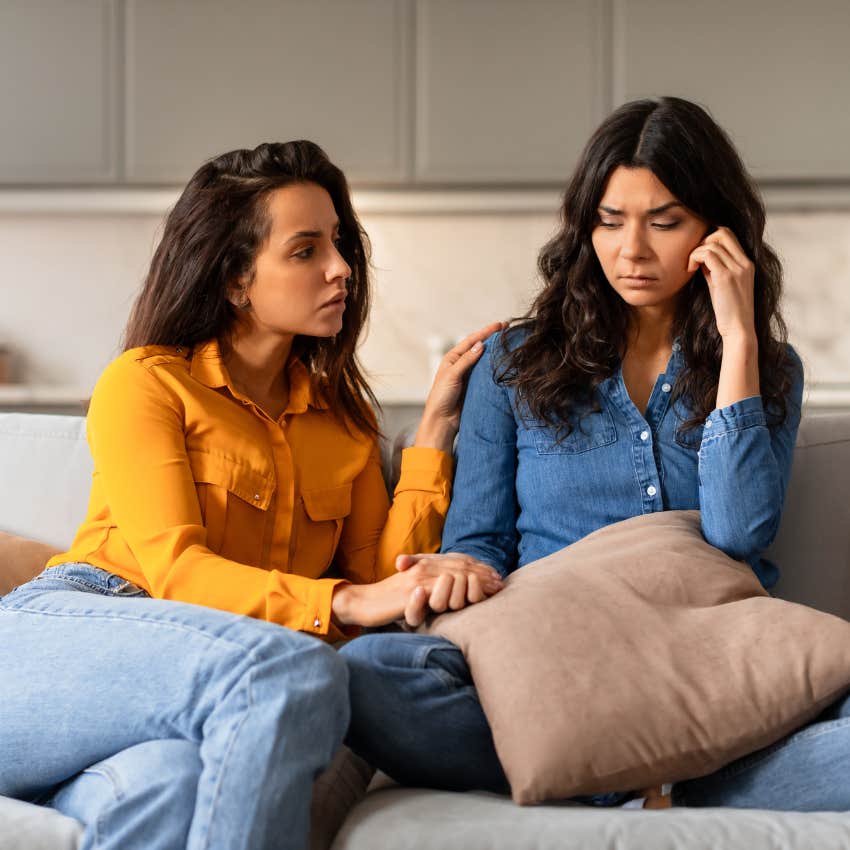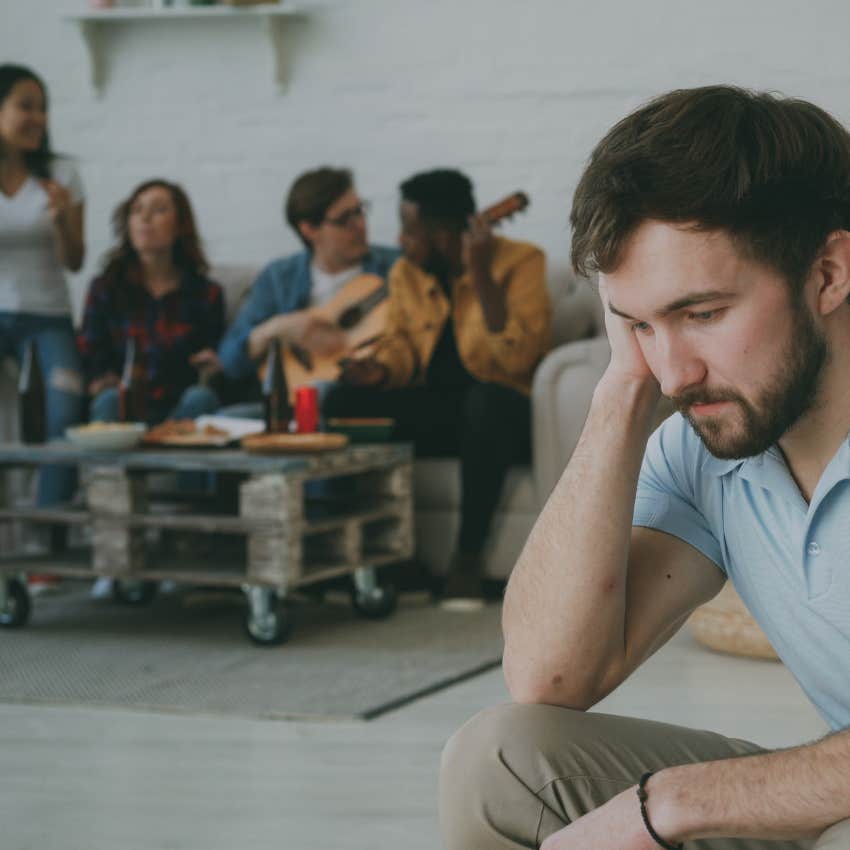People Who Feel Anxious In Social Situations But Hide It Well Usually Do These 7 Things
Even when social anxiety is hidden by a calm exterior, it still shows up in subtle behaviors.
 Mieke Campbell | Unsplash
Mieke Campbell | Unsplash Imagine spending your whole night out with friends, focusing on what everyone is thinking about you, and how they’re judging every word that comes out of your mouth.
Then, when you go home, you spend the next few hours replaying everything you said, wondering whether or not everyone else there thought it was cool, smart, or witty, or if you just sounded stupid and ruined everyone’s time.
This is the life of someone with social anxiety. Social anxiety, or social phobia, affects about 15 million American adults. Even though it’s extremely common, it can be tough for people who’ve never experienced this fear of human interaction to understand it.
People who feel anxious in social situations but hide it well usually do these seven things:
1. Worry a lot
“The most important thing is to not take someone else’s anxiety personally,” explains Julie Pike, Ph.D., a licensed psychologist and expert in the treatment of anxiety disorders.
“Because it really has nothing to do with us as individuals. If I’m anxious with 100 percent of a large friend group, it’s not them.” And it doesn’t mean your friend doesn’t trust you or feel comfortable around you.
However, if you’ve fought recently and there’s residual tension, she may have a tough time moving past that and feeling confident in the interaction. Again, it doesn’t necessarily mean you are doing something wrong. But it means she, for whatever reason, is afraid of being judged or saying the wrong thing.
2. Act aloof
 Prostock-studio / Shutterstock
Prostock-studio / Shutterstock
If a friend with social anxiety seems disinterested in your conversation, like she’s ignoring you, or giving you the cold shoulder at a party, it’s not that she doesn’t want to talk to you. She’s just really focusing all her energy on quelling that anxiety.
“Often people don’t notice socially anxious people are anxious,” said the late Dianne Chambless, Ph.D., former professor of psychology and director of clinical training for the University of Pennsylvania’s department of psychology.
“It may just look like they’re acting cold.” Which, ironically, can make someone come across as less likable, the thing socially anxious people fear most.
3. Cancel last minute
If your friend is turning down plans to go out or cancelling on you, it may just be that she’s trying to avoid situations that give her anxiety.
Instead of fading away and writing her off as a bad friend (which will just reinforce her feelings that she is faulty and not enjoyable to be around), carefully reach out and find out what’s up. Chances are, an honest conversation will clear up any doubts about where you both stand.
4. Struggle to make conversation or talk too much
While anxiety around strangers is more typical, some people may have a tougher time around close friends.
“It’s less common, but there’s no hard and fast rule,” Dr. Pike explains. “It’s really more about what we regard as most threatening. If my brain registers it as more of a threat if my friends judge me poorly than if strangers do, then that’s what I’m going to be anxious about.”
Part of the reason social anxiety is so frustrating is that people suffering from it care too much about forming relationships, even though it may seem like the opposite.
“If they didn’t care about being with other people, it wouldn’t be distressing,” Chambless explains. “People with social anxiety are unhappy about not having relationships.”
When your body senses fear and your sympathetic nervous system (your “fight or flight” response) kicks in, you can actually lose your ability to concentrate or remember, Pike explains. “People then get on a continuous feedback loop, where because they blank out, have an awkward interaction, and then go home and rehash it and kick themselves and feel horrible for having blanked out, they become so apprehensive of the next time,” says Pike.
Then the anxiety just compounds. If this happens to your friend, just be calm and let them feel anxious and gather their thoughts without pushing.
5. Project false confidence
People with social anxiety may actually be very confident in other skills or parts of their lives, even though they lack self-confidence when it comes to meeting new people or interacting with a group. “Anytime anyone has significant anxiety about something, they lack self-confidence about that situation,” Chambless explains.
But interacting with people is a huge part of life, so having serious anxiety in that realm can impact other aspects of life that someone does feel rock-solid in.
6. Prefer intimate gatherings over big parties
 silverkblackstock / Shutterstock
silverkblackstock / Shutterstock
Other than public speaking (for some people), going to a big party is probably the scariest place for someone with social anxiety. Parties involve a lot of chitchat, which is extremely anxiety-inducing.
“People with social anxiety have a tough time with chitchat, because they believe everything they have to say has to be smart or witty,” Chambless says.
Even though let’s be honest, most chitchat is boring and mundane, those with social phobias are still afraid of being judged for saying the wrong thing.
7. Drink a lot
Some people turn to alcohol to self-medicate in social situations, Chambless notes. If your friend is drinking too much every time you go to a party, have a frank conversation and tell her you’re concerned. “They may be doing this to cope with anxiety, but it’s not going to help in the long run.”
Simply say something like, “I’m concerned about you, I’ve noticed this, and it’s not like you to get that drunk. I’ve seen this happen several times, and it worries me.” Showing you care, instead of getting angry when you have to put her in a cab home again, reassures her that you truly want what’s best for her.
Unless your friend tells you not to do so, encouraging someone who is socially anxious to face their fears is the best way to help them — that, combined with letting them know they’re doing okay.
“The biggest thing is not to tell someone not to be anxious,” Pike explains. “The best thing people can say is, ‘I know this is hard for you and I’m proud of you,’ or ‘Good for you, I love you, I care about you.’”
Then, help guide them through challenging situations, and encourage them to do things that make their anxiety higher (within reason) so that it’ll get easier with time. They don’t want to be anxious forever, and a little boost from a friend may be exactly what they need to start overcoming those fears.
Amy Marturana is a freelance writer and editor, certified personal trainer based in central New York.

